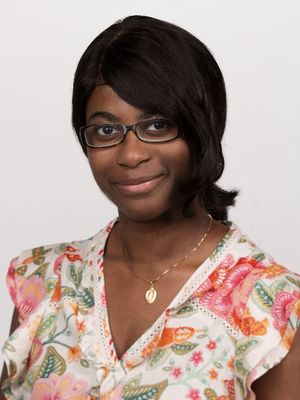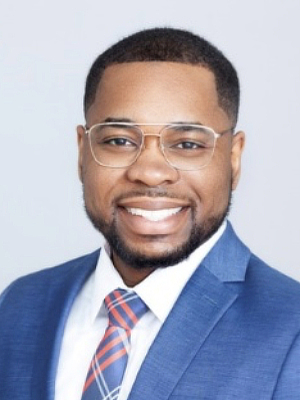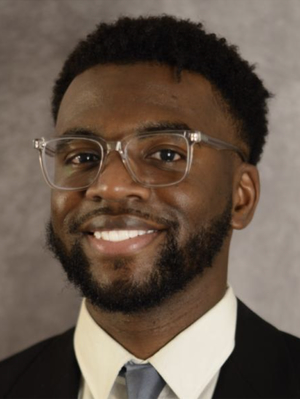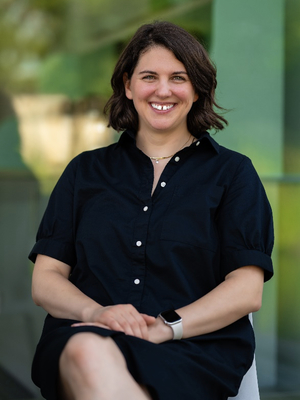Current Scholars
TRACS: Transitions to Academic Careers
TRACS is a one-year paid research training program for medical, graduate, and select post-baccalaureate students. With a research focus on the structural drivers of health and health equity and a one-year stipend, TRACS prepares students for residency or post-doctoral training.
Check out this year's cohort.

Valerie Chateau
Valerie Chateau's education was at Long Island University, where she graduated Magna
Cum Laude with a B.S. in Health Science as a HOPE Scholar. There she grew an interest
in biomedicine and public health. She was a 2-year intern at the Brooklyn-Queens-Long
Island Area Health Education Center (BQLI-AHEC). She broadened her understanding of
healthcare complexities by engaging in interdisciplinary work and contributing to
community-based initiatives in medically underserved areas throughout NYC. Notably,
she was involved with the Commission on the Public Health System (CPHS) in designing
and implementing the "Collecting the Invisible Experiences During COVID-19" survey
to address health disparities and advocate for policy changes. As a SPRINTER Student
at SUNY Downstate Medical Center, she worked on research to correlate stress levels
with educational attainment; shedding light on the intricate relationship between
social determinants and health outcomes. Her current TRACS study is focused on advancing
health equity in clinical practice by implementing structural competencies and working
with the Coalition to Eliminate Racism in Clinical Algorithm (CERCA). She is working
under the guidance of Dr. Carla Boutin-Foster, Dr. Margaret Salisu, and Ms. Jenique
Reid.
What do you look forward to gaining from the TRANSPORT TRACS program?
"From the TRANSPORT TRACS program, I look forward to enhancing my research capacity,
contributing to scientific publications, and strengthening my foundation in health
equity in public health and clinical settings. These skills and opportunities would
align perfectly with my aspiration to become a well-rounded physician."

Cordero McCall
Cordero McCall is a third-year medical student at the Medical College of Wisconsin.
He earned both his Bachelor of Science and Master of Public Health degrees at SUNY
Albany. In later years, he earned Master of Business at Saint Louis University in
hopes of utilizing both his MBA and MPH during his medical endeavors.
McCall is a Nth dimensions scholar, research fellow, and member of the esteemed Alpha
Phi Alpha Fraternity, Incorporated. He is also a proud alumnus of Northwestern University's
Minority Health and Health Disparities Research Training Program, Northwestern University's
Uterine Leiomyoma Research Center Lab Immersion Program, and Rothman's Orthopaedic
Summer Immersion Research Program.
His passions are directly focused on bridging the gap between underserved populations
and increasing access to care for these vulnerable populations.
His research interests are largely focused on creating more equitable environments
for the underserved and advancing health equity. His projects are mostly focused on
basic, translational, clinical, and population science. His current research projects
include colorectal men's health, prostate cancer, orthopaedics, chronic diseases,
and global health. He is currently working in Dr. Camacho Rivera's research lab.
What do you look forward to gaining from the TRANSPORT TRACS program?
"I am eager to collaborate with you and your team to better understand how to conduct
research at a high level, better develop myself as a growing professional, and meet
and retain lifelong mentors. Ultimately, my goal is to become an orthopaedic surgeon
and to return to New York so that I can address many of the socioeconomic disparities
that I experienced as a child growing up in Brooklyn, NY. I have spent over 10 years
working in the medical field in several entry-level and mid-level positions to be
able to better address my community. After becoming a medical student, I began to
understand that working towards health equity may be the first step in reducing the
disparities seen in underserved communities. With this program, leadership, and dedicated
faculty and staff, I know that I will become the physician that I’ve always dreamed
of becoming."

Tobi Somorin
Tobi Somorin is a rising 4th-year MD/MPH candidate at SUNY Downstate College of Medicine.
A lifelong New Yorker, Tobi was born in the Bronx and raised in Middletown, New York.
He earned his degree in Biochemistry from Stony Brook University, where he worked
with the National Cancer Institute to research cancer health disparities in minority
communities. Tobi's passion for addressing institutional-level health disparities
and promoting health equity led him to pursue a combined MD/MPH degree with a focus
on Health Policy and Healthcare Administration.
Tobi is spending his research year serving as the Craniofacial and Pediatric Plastic
Surgery Research Fellow at the Children's Hospital of Pittsburgh, and a Transition
to Academic Careers (TRACS) Scholar.
As a research fellow, Tobi is excited to research advancements in pediatric plastic
surgery, cleft and craniofacial conditions, and the integrations of imaging and machine
learning under the mentorship of Dr. Jesse Goldstein. Tobi is also committed to developing
interventions that promote health equity on a systems level through his involvement
as a TRACS scholar under the guidance of Dr. Marlene Camaco-Rivera.
What do you look forward to gaining from the TRANSPORT TRACS program?
"I’m eager to delve into the complexities of structural racism and health inequity
in our country and research policy-level solutions. The TRANSPORT TRACS program stands
out above other programs because it embraces the importance of researching institutional
racism while seeking ways to address it. There has been a thorough discourse on healthcare
disparities, but unfortunately a paucity of proposed solutions to this issue. I am
excited to add more solutions to the table this year and throughout my career as an
academic surgeon."
PRIDE: Program to Increase Diversity Among Individuals Engaged in Health Related Research

Dr. José E. Diaz
José E. Diaz is a Research Assistant Professor in the STAR Program and Department
of Medicine at SUNY Downstate Health Sciences University. Dr. Diaz’s research centers
on contextualizing health inequities, including HIV and substance use, among sexually
minoritized populations, with an emphasis on care/treatment access and Hispanic/Latino/x/e
(Latine) sexual minoritized men (SMM). His recent work examined how intersectional
stigma and resilience are linked to past-year substance use treatment utilization
among Latine SMM who use stimulants (i.e., cocaine, methamphetamine). He has collaborated
on studies exploring the feasibility of home blood/urine specimen collection for laboratory
testing of relevant health indicators (e.g., HIV viral load, recent substance use)
to potentially support treatment disengaged SMM. Lastly, Dr. Diaz recently completed
work on a longitudinal study seeking to examine how neighborhood contexts and social
networks impact HIV care outcomes among Black and Latine SMM with HIV who live in
New York City. His primary mentor is Dr. Sabina Hirshfield.
What do you look forward to gaining from the Junior Faculty program?
"My participation in the TRANSPORT Junior Faculty PRIDE Program comes at a critical
juncture in my career. As part of the program, I am looking forward to further building
my capacity as an independent researcher by working towards and securing additional
NIH funding, growing content expertise that supports the expansion of my research
portfolio, and receiving guidance and mentorship that will shape me into a stronger
mentor as well."

Zoe Neale
Dr. Zoe Neale is an Assistant Professor in the Department of Psychiatry at SUNY Downstate
Health Sciences University. She earned her Ph.D. in Clinical Psychology from Virginia
Commonwealth University, where her NIAAA F31-funded research focused on integrating
genetics into alcohol use prevention for youth. Her T32 postdoctoral fellowship at
Boston University and the VA Boston Healthcare System afforded specialized clinical
and research training in traumatic stress, with an emphasis on neurobiological correlates
and dementia risk in veterans. Dr. Neale's current research explores the intersections
of trauma, genetics, and neurodevelopment, with a particular emphasis on alcohol use,
post-traumatic stress disorder, and brain health (e.g., neural functioning, dementia)
across the lifespan. Dr. Neale is also committed to conducting research that expands
understanding of genetics in underrepresented groups, with the goal of promoting health
equity and advancing precision medicine for individuals from all backgrounds. Her
primary mentor is Dr. Jacquelyn Meyers.
What do you look forward to gaining from the Junior Faculty program?
"I am excited about the TRANSPORT Junior Faculty program as it provides an invaluable
opportunity to advance my research and grantsmanship skills, particularly in the context
of health disparities. I very much look forward to connecting with fellow scholars
and mentors who share a passion for addressing these critical issues. Through this
program, I hope to gain deeper insights into translational research and further refine
my work on the genomics of trauma, alcohol, and aging, with the goal of informing
interventions that promote brain health and resilience in diverse populations."